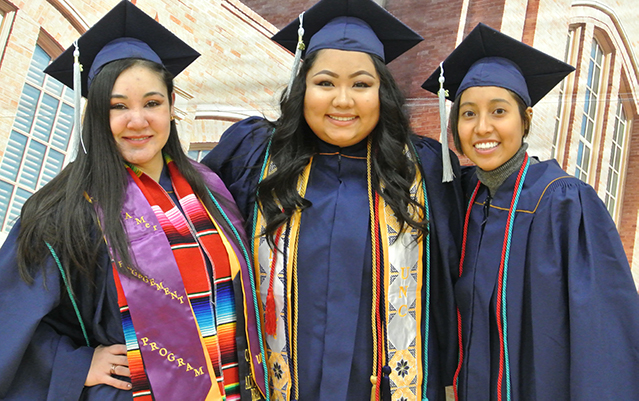UNC alumni and donors are known for their generous hearts. Every year, our community benefits from the time, talent and mentorship of those who give back. There are hundreds of ways that donors directly impact students. In the case of the Cumbres program, those students are future English as a Second Language (ESL) teachers.
Cumbres, a program in UNC’s College of Education and Behavioral Sciences, is a scholarship and support program that prepares educators skilled in culturally and linguistically diverse practices. Cumbres participants live in a Residential Learning Community their first year with an upper-level Cumbres student as their residential advisor. They take classes together. They’re mentored by a current teacher. And they complete a capstone leadership project.
Cumbres has a history of consistent philanthropic support among former participants, many of whom currently work as teachers. Their gifts quickly add up and enable the program to continue its success in preparing marketable and compassionate educators.

“A gift of any size counts and makes a huge difference and has an impact,” says Aldo Romero, Ph.D., the program’s director. Scholarship money helps to pay for tuition and in some instances for tests that students have to take for their teaching certifications, in addition to other costs. Cumbres serves about 100 students per year and awards $750 per semester to many of those students who maintain a minimum GPA and progress toward a teaching degree and TESL endorsement (which can be especially crucial for DREAMers, who don’t have access to federal funds).
“The scholarship money is really one of the main reasons why UNC was affordable for me,” says April Getz, a senior about to graduate with a degree in Early Childhood Special Education. “Having that Cumbres scholarship on top of a couple of other things, that helped knock some things off of my bill, really took the financial stress off, and helped me focus on what I needed to be focusing on.”
In addition to funding student learning, donors provide moral support to their fellow Bears. Romero works with UNC's Office of Development to connect with donors around the state and country, and occasionally a donor will even come meet with a cohort of students in their residence hall to hear about their experience or take them to a UNC football game. But whether donors visit campus, remain anonymous, or something in between, they impact students for the better.
“Your generosity sends a clear message to our students: that you believe in them,” Romero says.
Jingzi (Ginny) Huang, Ph.D., associate dean of UNC’s College of Education and Behavioral Sciences and director of the School of Teacher Education, donated to Cumbres during UNC’s recent Bearnanza, a week of philanthropy at the beginning of December. Her reasons for choosing to give to Cumbres were practical, she says.
“It’s a great program that attracts students from diverse backgrounds and does a great job with retention,” she says. “Students who graduate from the Cumbres program have confidence to make changes in the field of education.”
Huang watches the program enter diverse candidates into the teacher pipeline and prepare future teachers to work with diverse populations. Those two outcomes have been hallmarks of Cumbres since its inception more than 20 years ago, which was prompted by a group of mostly Hispanic students who observed a lack of Hispanic teachers in schools. Today, the program continues to serve a large proportion of UNC’s first-generation and Latinx students. A few years ago, the Council of Chief State School Officers (CCSSO) kicked off a Diverse and Learner-Ready Teachers (DLRT) Initiative, which also seeks to produce diverse teachers and teachers who are culturally responsive.
“Cumbres has been doing these since the beginning of the program,” Huang says.
The support Cumbres offers extends beyond the classroom, helping with student retention and success. For example, Getz broke both her hands during a tug-of-war game gone awry her first semester of college, and she had to take three weeks off for surgery and recovery. The first people she thought to talk to, she says, were Romero, Cumbres’ director; and Penny Mascarenas, Cumbres’ program coordinator.
“They basically talked me through it and helped reach out to my professors, and I ended up finishing the semester just fine,” Getz says. “But it would’ve been a lot harder without them.”
Getz says the highlight of the program was living in the Residential Learning Community in Brown Hall her first year, bonding with her cohort.
“I think it’s a good way to bring freshmen together and sort of create that sense of home,” she says.
Once students complete the program, their time with Cumbres sets them up for success. Most graduates are hired immediately, Romero says, earning teaching jobs around Colorado and the U.S. So every dollar toward helping a student persist and earn their TESL endorsement is well-spent.
“No matter what dollar amount one can contribute,” Huang says, “it will make an impact right away.”
Are you a UNC donor? Check your mail in early February for a summary of your previous year’s giving, as well as examples of how YOUR generosity is making a difference!



